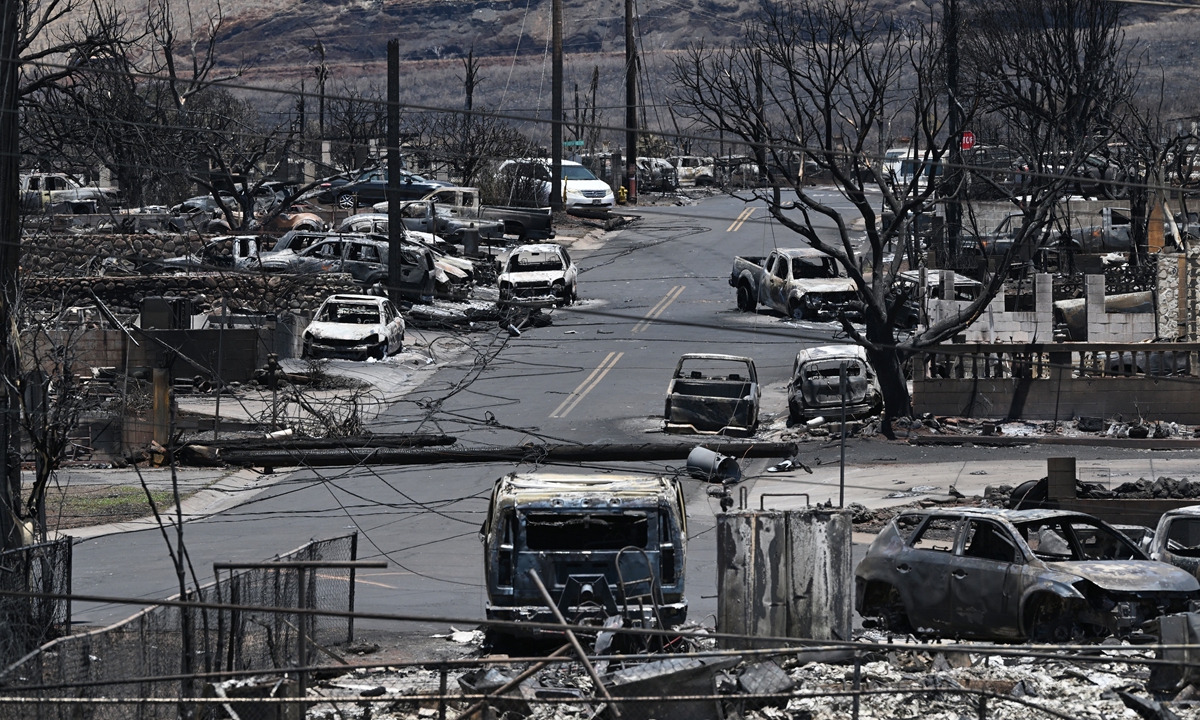
Fire damage is seen on August 12, 2023 in Lahaina, Hawaii of the US. The death toll continues to rise for the deadliest wildfires in the US in over a century, and as of press time, the number reached 93. Photo: VCG
Deadly wildfires have ravaged the US state of Hawaii for most of the past week. As of press time, the death toll from the Maui wildfires has climbed to 99 - making these fires the deadliest in modern US history, surpassing the 2018 Camp Fire in California. There are also at least 1,000 people still missing. This terrible disaster highlights the pressing need for climate action from US politicians.
The cause of the fires has been under speculation, with many conspiracy theories popping up that, perhaps not so coincidentally, obfuscate the role of climate change. We know that Hawaii normally has forest fires during the summer - but the area of their natural range expanded in recent decades, nearly quadrupling. One of the important factors, as noted by the New York Times, is the increase in highly flammable invasive species that were allowed to spread because of plantation closures.
We also know that a significant part of the county of Maui was under drought conditions and that a decrease in rainfall is one of the most visible signs of climate change. In any case, the most widely accepted version of events suggests anthropogenic causes for the two most important factors that led to this disaster. And that means policymakers need to take the necessary steps to ensure it doesn't happen again.
However, it is important to bear in mind what this means. The climate and attendant extreme weather events we see today are unfortunately our new normal, and they will probably only get worse. That means we need to develop solutions to ensure public safety within the framework of this new normal.
While some fires are unavoidable and natural, ones with such a destructive impact are not and should be treated as avoidable. Local authorities in Maui knew that these specific areas hit by the wildfires were susceptible with great certainty but the necessary measures weren't taken. Experts quoted by the New York Times pointed to concrete measures - firebreaks, more fire-resistant vegetation and having livestock keep grasses at a manageable level - as remedies already on the toolbox that were not implemented effectively but were cited for years in reports.
The picture of Maui that is emerging is a locality with low funds, which are mostly already used on a ballooning housing crisis and other concerns, and stuck in perpetual competition for ever-decreasing federal money. The most pressing is funding - or more specifically a lack of funding. Growing climate concerns, including the fact that relevant reports suggest the vast majority of the country is ill-prepared for the disastrous effects of climate change, show the need for climate funds to be dispersed.
It has been said that a country's priorities can be seen in its annual budget. If that is the case, then it is clear that the US cares little about the climate. Reports show Biden's budget plan calls for nearly $45 billion to tackle climate change in fiscal year 2023, while in the same period, US Department of Defense had $1.77 trillion distributed among its six sub-components. The US desperately needs to heed the advice of relevant experts and disperse more climate funds in its annual budget to prevent avoidable disasters and deaths.
In addition to not building the necessary infrastructure to manage the worst deleterious effects of climate change, the federal government is exacerbating the situation. As the New York Times again wrote in a piece about the need to convince people to switch to green tech, "Corporations are building new coal mines, oil rigs and gas pipelines. The government continues to award leases for drilling projects on public lands and in federal waters and still subsidizes the industries. After posting record profits last year, leading oil companies are backing away from recent promises to invest more heavily in renewable energy."
After the deadliest wildfires in American history, one would hope that this would be the impetus to stop handing out licenses to corporations to plunder our planet. But, all bets are off that this will amount to any serious action from Joe Biden, the man, the revolutionary, who once uttered that "nothing would fundamentally change" under his leadership. And so nothing has; the engines of greed churn ahead.
The author is a Prague-based American journalist, columnist and political commentator. opinion@globaltimes.com.cn



